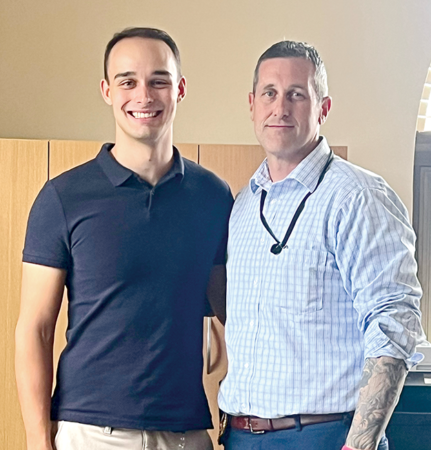Paul Kurt is a young man training to be a police officer in his native Frankenberg, Germany, located in the state of Hesse. He has cousins living here in Williamsport and made arrangements to intern with the Williamsport Bureau of Police. For the past several months, he has served with them doing that internship and is currently on his way back to Germany. Webb Weekly interviewed him about his experience with the WBP, and what follows is that interview.
What has surprised you the most about your experience with the Williamsport Police Department?
I had to find out that even though Williamsport is a small town, there are many serious violent crimes. But the police officers do not back down, and I am fascinated by how motivated and committed they are. They welcomed me with open arms, and they were all very kind.
What do you notice that is different about Americans’ interactions with police compared with Germans’ interactions?
It is well known that there is a big issue with firearms in this country. So in every encounter with a 911 call, there is always that thought of a firearm in the back of an officer’s mind.
On the other side, if people encounter the police, they think about all the incidents which are on the news that went wrong.
But it is worth mentioning that even though just one police officer is responsible for such an incident, the fault is transferred to all the other police officers. Thus, some of the people the police encounters are hostile toward the officers and do not trust them.
What type of duties have you assisted with during your internship?
I was able to observe the everyday police work as well as the work of the detectives, including responding to all kinds of 911 calls, such as domestic violence, robbery, theft, a drug raid, and encounters with witnesses, victims, and suspects.
I had many ride-along with the officers of the Williamsport Police Department. I also had the opportunity to have a ride along with the Lycoming Regional Police Department and visit the 911 Center. I trained with the Special Response Team (SRT) and the K9-Unit. In addition to that, I joined several community outreach events with the WBP. Moreover, I attended a trial, and I was able to speak with a District Attorney and a judge.
How do American policing methods differ from German ones?
The most prominent aspect is that the police officers ride mostly alone in a patrol unit here. In Germany, it is mandatory to have a partner to ride with. At first, I thought that it was not a good idea, but I have learned that it actually is. The police can cover more ground with the same amount of officers, and there is backup in a matter of a few minutes.
I also discovered that the WBP puts a big focus on the community and the relationship between the Police Department and the public.
But all in all, the WBP and the Police in Germany are quite similar concerning police work, techniques, and laws.
What is the most unusual thing you have encountered during your internship?
We stopped a person for tailgating, and during the traffic stop, he stated that we “busted him for DUI.” As a result, we conducted a breathalyzer test, and the device showed an alcohol level of 0.32. Although the high amount of alcohol, the accused was able to speak clearly and act normally.
What have you learned from the Williamsport police experience?
I have learned how the American police work, how they handle police encounters, and how they investigate crime. I have also learned that even though gun violence is a big topic in the US, it is actually not as bad as it is portrayed. Also, riding alone in a patrol unit is not as dangerous as I thought it would be, and it actually makes sense.
What I definitely take back home to Germany is the concept of School Resource Officers and that police officers teach children in school about law, self-defense, and proper behavior. Another thing I will take back to Germany is the concept of community outreach and building a relationship with the public and the local community.
In addition to that, I was able to learn about the American justice system, including laws, regulations/legislation, and the court system.
Are Americans too pushy and cocky about their supposed rights as compared to German citizens?
The type of people police encounters in the USA are similar to the ones we encounter in Germany. They think that they know the law better than the police officers, even though they went through long training, and they deal with the laws every day. Also, I have experienced anti-police rhetoric in both countries.
What is the overriding conclusion that you take away from your experience here?
It was a once-in-a-lifetime experience to do this internship with the Williamsport Police Department. I gained a lot of knowledge, I was able to experience so much, and I made friends for life. I have learned that the relationship between the police and the community is very important and helpful. I have observed that the work of the Williamsport Police officers is of high quality and that they are very motivated and committed to their job. I also take away that empathy on both sides is very important and essential for good police work.
In Germany, we have to do a three-year training to become a police officer. We attend a university/academy of the Police, and we also do our bachelor’s degree. When we apply to the police, we can go straight to the patrol unit, or we can go to the detective’s office. We have six semesters, and I am in the fifth of six to become a detective. In the fifth semester, we have all kinds of internships, and we also have the opportunity to go to a foreign agency. I was very lucky to have family in Williamsport, so I called Chief Snyder, and he immediately agreed to the internship.
I would like to thank Chief (Justin) Snyder and Assistant Chief (Jason) Bolt, and all the other police officers of the Williamsport Bureau of Police.




